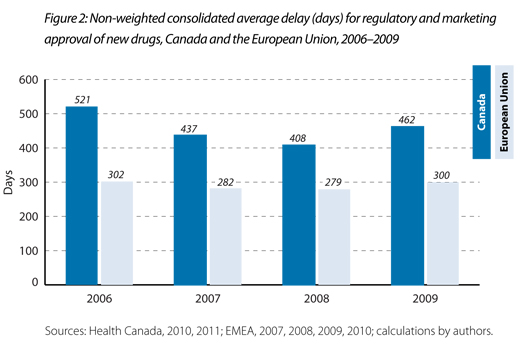Canadians Also Wait for Drugs
A recent study by the Fraser Institute found that Canadian federal and provincial government bureaucracies are taking more than two-and-a-half years on average to approve new prescription drugs, thereby depriving many Canadians of the latest in new medicines.
Findings include:
- Only 23 percent of new drugs approved as safe and effective by Health Canada in 2004 had been approved for either full or partial reimbursement under provincial drug plans as of June 9, 2011, compared to 98 percent that had been covered by at least one private insurer.
- Compared to its international counterparts, Health Canada takes longer to certify new drugs.
- From 2006 to 2009, Health Canada’s performance was worse than that of the EMEA, Health Canada’s European equivalent.
- Health Canada’s performance was worse than that of the U.S. Food and Drug Administration in five of the last six years studied (2004 to 2009).



Interesting post.
Not surprised. For every year they wait to approve a new drug, the fewer years the government has to pay for the name brand drug.
What this means is that Canadians are waiting for drugs, just as they wait for other kinds of care — much more so than we do here in the United States.
Canadians wait for drugs? We’re supposed to be surprised at that?
In most provinces, prescription drugs are not included in the single-payer, government monopoly heatlh system that covers medical and hospitalization. Provincial prescription-drug plans are usually for low-income residents or seniors.
What Americans might not understand is that working-age Canadians in most provinces receive provate prescription benefits from their employers, alongside dental and vision.
The latter two, of course, are also employer-based benefits in the U.S., where prescription coverage is generally included in comprehensive health benefits.
The fact that Canadian private drug plans are so much faster to cover new prescription drugs than provincial drug plans are should make Canadians question why they tolerate a government monopoly over their access to physicians and hospitals.
Many drugs and treatments readily available to Americans are either only sparingly or not at all available to Canadians. Canada has a MUCH smaller population too. Both countries need to reform their individual systems.
And all you guys hit the nail directly on the head!